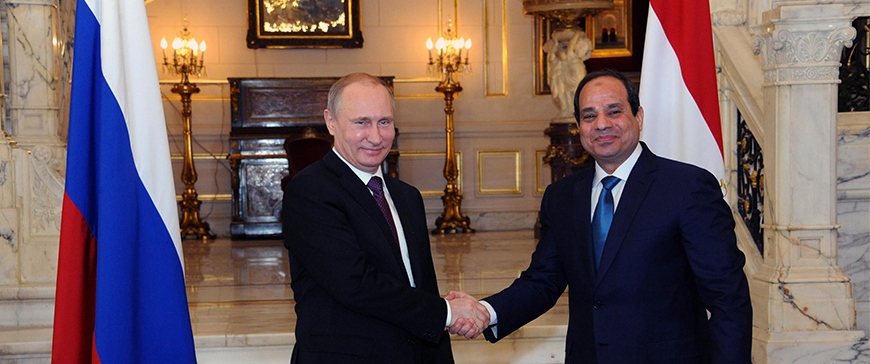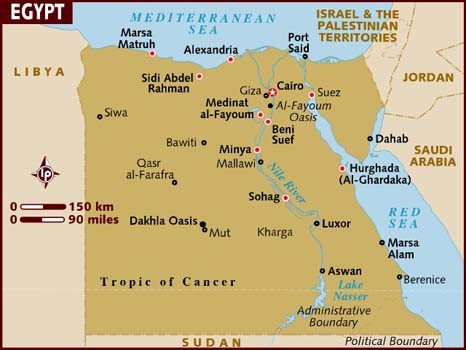Egypt Russia grow closer
December 1, 2017 | Expert Insights

The Egyptian government has decided to expand defense ties with Russia. Egypt has now signed a preliminary agreement to allow Russian military jets to use its airspace and bases.
Background
Relations between Russia and Egypt have a long history. In the 1950s, Gamal Abdel Nasser independent and anti-imperialist policy earned him enthusiastic support from the Communist government of the USSR. After the death of Nasser, the relationship between the two nations began to deteriorate. The new president Anwar Sadat started re-orienting the country toward the West. However, post 2013, the bilateral ties between both countries has improved. This was jumpstarted following the July 2013 military coup that ousted Egypt's president Mohamed Morsi.
The U.S. had minimal dealings with Egypt when it was controlled by the Ottoman Empire (before 1882) and Britain (1882–1945). However, it improved after the peace treaty with Israel. Following these period, Egypt acquired about $19 billion in military aid, making Egypt the second largest non-NATO recipient of U.S. military aid after Israel. Also, Egypt received about $30 billion in economic aid within the same time frame. In 2009, the U.S. provided a military assistance of US$1.3 billion (inflation adjusted US$ 1.45 billion in 2017), and an economic assistance of US$250 million (inflation adjusted US$ 279.1 million in 2017). In total, the United States has provided Egypt more than $70 billion in aid in the four decades.

Analysis
In the recent years, Russia has increased its influence and presence in the Middle East. It has also forged stronger relations with countries in the region. There has been a growing demand for Russian weapons in Arab nations. Moscow has seen significantly increased sales in the Middle East.
In 2017, at the Dubai Airshow, Russia exhibited a wide range of aviation hardware, including the Ka-52 combat helicopter, MiG-29M and Su-35 fighter jets, and the Be-200 multipurpose amphibious aircraft. Russia also displayed the Mi-35M combat-transport helicopter, the S-400 Triumph long-range air defense system and the short-range Pantsir-S1 air defense missile system.
In particular, the Egyptian government has decided to expand defense ties with Russia. In recent months, the two nations have signed several arms contracts for Russian-made MiG-29 fighter jets, Ka-52 helicopters, and other weapons. In what now appears to be a snub to United States, Egypt has signed a preliminary agreement to allow Russian military jets to use its airspace and bases. This would allow the two countries to use each other’s airspace and airbases. Russian and Egyptian war planes would be able to use each other’s air space and airfields by giving five days advance notice, according to the draft agreement, which is expected to be valid for five years and could be extended.
The agreement would cover not only fighter jets and bombers, but also airborne radar pickets and military transport planes carrying hazardous cargo, the document says. The mutual use document will last for five years, with prolongation possible. Russian Defense Minister Sergei Shoigu visited Cairo for talks with Egypt’s political and military leadership.
“Power abhors a vacuum and when the United States pulls back we can’t be under the impression that the world is going to stand by and wait for us,” said Matthew Spence, a former deputy assistant secretary of defense for Middle East policy under the Obama administration, which faced similar criticism for its policy toward the region. “The danger, and the reality, is that other countries will take advantage of the opportunity presented when America chooses to pull back.”
“It’s a major problem for the United States-Egypt defense relationship,” said Andrew Miller, a former senior State Department official who is now at the Project on Middle East Democracy. Edgar Vasquez, a State Department spokesman, said, “We are aware of these reports and are monitoring the situation.”
Russia has launched a military operation to support Syrian President Bashar Assad in September 2015 and there are signs it is keen to further expand its military presence in the region.
Assessment
Our assessment is that the closer military ties between Egypt and Russia indicates the larger ambitions Russia has for the region. It should also be a cause of alarm for the United States. As Russia’s influence grows larger, the US’ sphere of influence will shrink in the Middle East. We believe that the significance of President Abdel Fattah al-Sisi’s recent visit to Russia lies less in the details of the talks between the president and his counterpart Vladmir Putin, than in the fact that it is his fourth visit since his first when he was defense minister. Egypt’s relationship with Russia, in terms of the Syrian and Saudi cases, illustrates both countries’ agendas Egypt is in the middle, playing an important role in bringing Saudi and Russia closer together. It disagrees with Saudi on Syria and with Russia on Yemen.








Comments